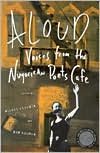

 |

|

The average rating for Aloud based on 2 reviews is 3 stars.
Review # 1 was written on 2007-10-30 00:00:00 Neil Anstett Neil AnstettI Now Understand that I Must Never Attend a Poetry Slam, by Jeff. An elusive medium for the competent, in this I am not democratic. Hush. |
Review # 2 was written on 2010-08-13 00:00:00 Elizabeth Richardson Elizabeth RichardsonI'm currently reading some of the authors in the "Founding Poems" section of this book, for the Poets of Color class I'm teaching. As well, I've just recently read and will reread Miguel Algarín's introduction. I'm so interested especially in the section of this intro re: the Open Room, and the open mic. Having never attended a poetry slam, and having limited the amount of time I've spent at open mics, I was both amused by his description of it and at the same time I admit it was a bit icky. I get that one event/live moment can make or break a poet's "career," i.e. whether s/he will continue to pursue the mic and performance. I see how immediate positive feedback can encourage a poet to try again, perhaps even think about bringing the new shit. I see, however, how a poet can become over-reliant upon his/her poems that are "hits," that get the audience every time, such that the audience anticipates/expects the hits. How does this kind of environment discourage the poet from pursuing new work, trying out different poetic devices, voices, aesthetics, et al. My question here is about the possibility of arrested development. What I appreciate about Algarín's description of the poetry slam is the emphasis on farce. I get this; how poetry is received and its value assessed, whether it is deemed effective or ineffective depends upon many factors - the performer's skill and experience both in performance and in writing, the audience's aesthetic preferences, political leanings, whether they are easily charmed by charismatic poets on the mic, etc. So given that there are many various ways of assessing a poem's and poet's effectiveness, given the imperative to decenter a singular academic standard of reading and criticizing poetry, indeed, I get farce. What I don't get, and this is beyond the scope of Algarín's intro, is how seriously slammers appear to take slam, if the purpose of slam is to engage in farcical contest. So that's a few things I am thinking about while reading. Another is this: as I am reading through the founding poems, it dawns on me that some of the poetry is kind of not awesome, is perhaps kind of awkward on the page, as is the case with Sandra Maria Estevez's poems. I may get shit for saying that, so again let me reemphasize that each audience member, and in the case of book, each reader has many different criteria for reading poetry. Given that (for the most part) the poems here are important social commentary, what I look for is poetry that pops, read aloud and on the page, such as the poems by Lois Griffith, who I've never heard of before. Her work reminds me of early Jessica Hagedorn - funky, sassy, serrated; I think of these two poets as drawing from the same well. I read Pedro Pietri's poems, particularly the Road Runner poem, the Telephone Booth poems, and "Uptown Train," and it feels like this is a totally different person than the one who wrote "Puerto Rican Obituary," (not included in this anthology) unless what I think of as a playful absurdism im the previous anthologized poems is something that came later, after the purge of the obituary (in which the "RISE TABLE RISE TABLE" is also a little playful/absurd). Just some disorganized thoughts here. Maybe more to come. |
CAN'T FIND WHAT YOU'RE LOOKING FOR? CLICK HERE!!!